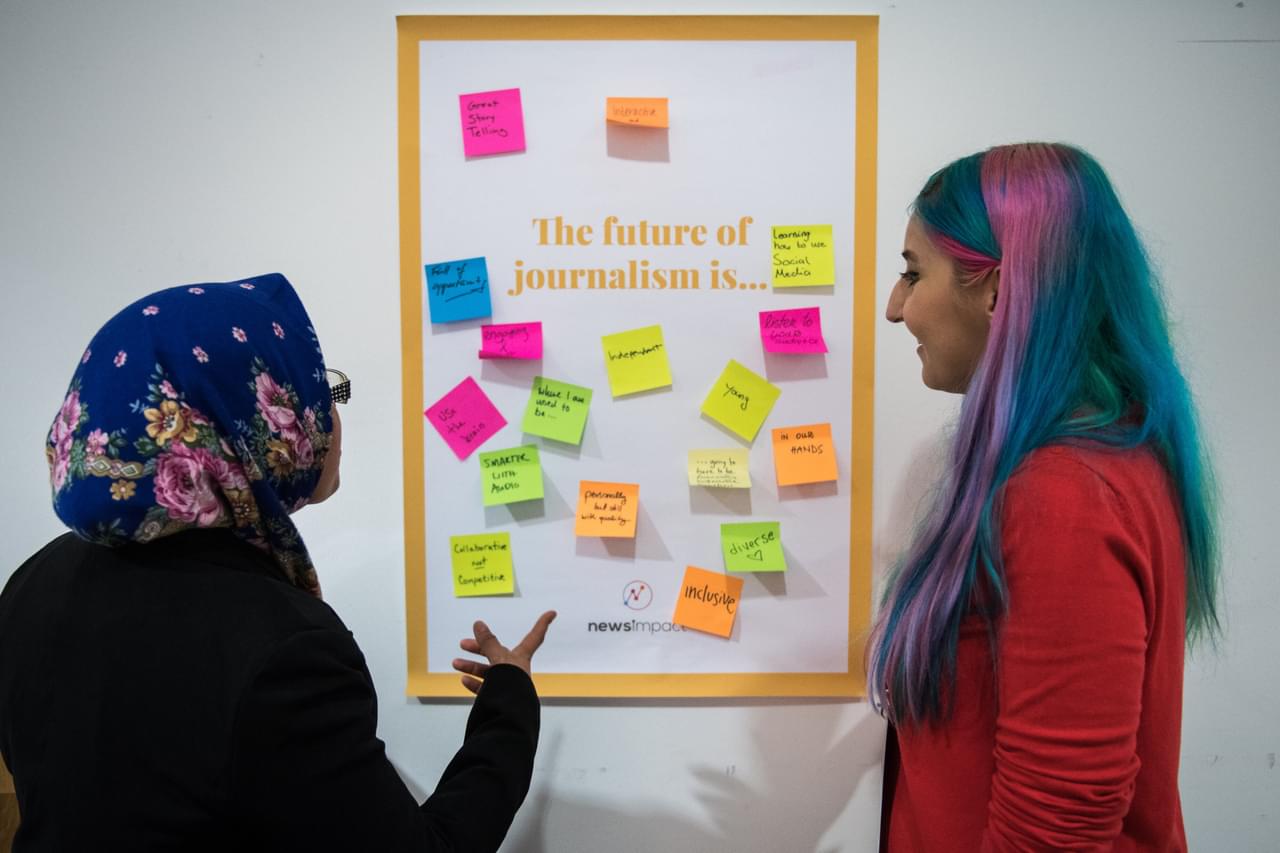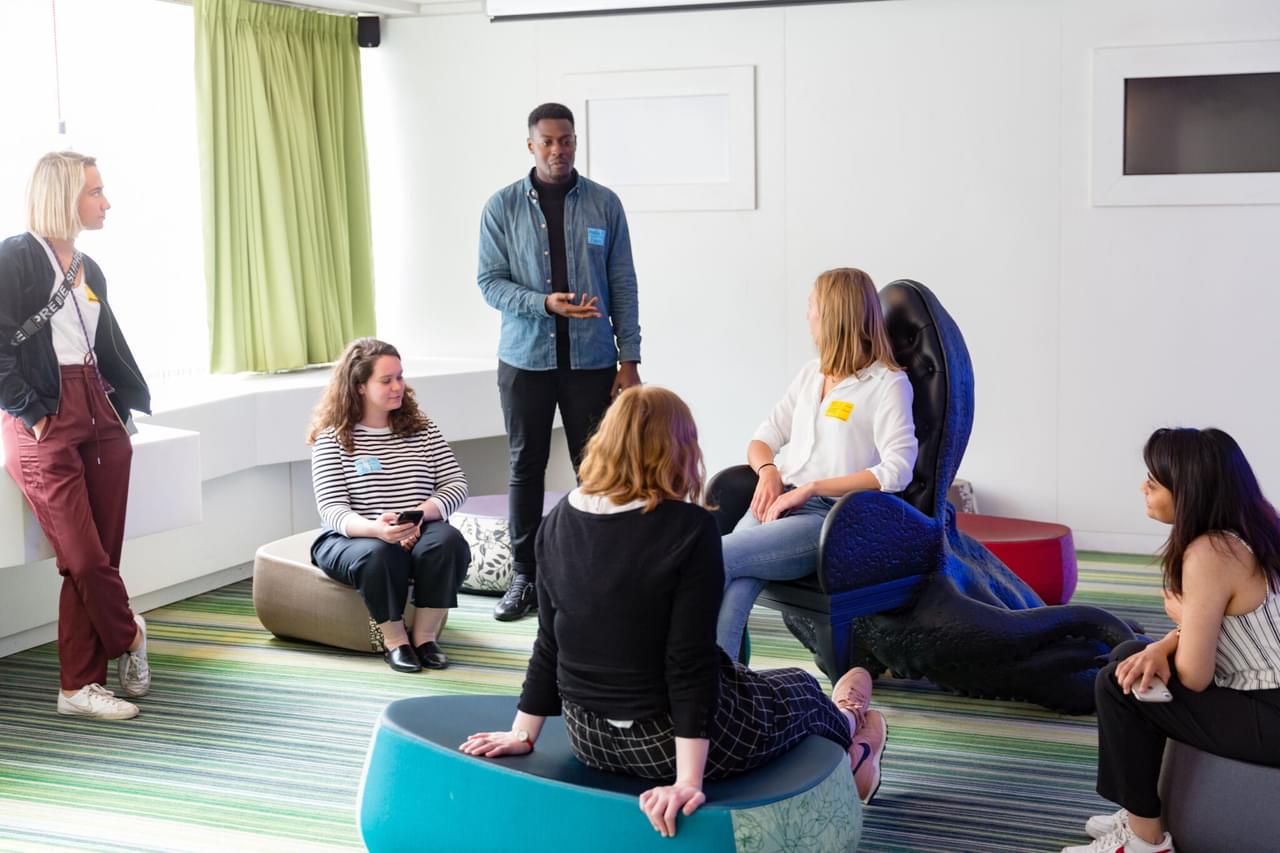
Insights
GNI Student Fellowship 2023: Boosting equal opportunities in media

The Google News Initiative Student Fellowship 2023 is now open for applications
We are excited to announce that applications are now open for the 2023 edition of the Google News Initiative Student Fellowship, the biggest entry-level journalism fellowship in Europe, managed by the European Journalism Centre in partnership with Google News Initiative.
Students and recent graduates have until 21 April to apply here and become a Student Fellow. The selected Fellows will spend their summer working at one of the 20 participating newsrooms across Europe on a fully-paid salary.
2023 marks the 5-year anniversary of the EJC-organised Fellowship. With 140 Student Fellows matched with newsrooms across 14 European countries over the past 5 years, the programme has played an important role in boosting opportunities for young and ambitious journalists across the European media landscape.
Roughly 35% of all Student Fellows have gone on to receive a job offer either at their host organisations or through its network.
Statistics from the previous GNI Student Fellows
This year, we are not only committed to supporting the next generation of media professionals, but we are also doubling down on our efforts to increase diversity, equity, and inclusion in the Fellowship programme.
Diversity, Equity and Inclusion (DEI)
We are shifting the focus of the programme this year to include a much greater emphasis on Diversity, Equity, and Inclusion (DEI). Newsrooms and journalists across Europe should be a reflection of the societies they cover. Not only this, but by promoting talented individuals from a broader range of backgrounds and perspectives, we strengthen the profession of journalism, helping it to better adapt and respond to new technologies, approaches, and challenges.
For both these reasons, diversity and inclusion will define the future of journalism, and we believe it is our responsibility to support this. We want to ensure we are reaching a diverse pool of young, ambitious people across Europe and that everyone who meets the eligibility criteria, regardless of background, has an equal opportunity of being selected as a Student Fellow. We will do this by implementing a blind recruitment process and working with diversity partners across Europe.
Blind recruitment
Studies have shown time and again that unconscious biases around factors such as gender, age, economic status, and ethnicity affect hiring decisions. To truly make the Fellowship accessible to all students and recent graduates who are interested in pursuing a career in media, we are implementing a blind recruitment selection process to limit unconscious bias as much as possible. This means that newsrooms will not know any personal information about the applicants during the selection process. In addition, the successful candidate will be chosen based on the results of a relevant task, such as writing an article or multimedia editing, which will highlight the skills of the applicants and not their backgrounds.
"The Fellowship is the only widely-recognised, competitive-admission internship at the intersection of journalism and technology and is therefore invaluable in identifying new talent, especially because it attracts so many applicants from academic disciplines beyond just journalism."
-Martin Stabe, data editor at Financial Times who implemented a blind selection process last year.
Diversity partners
In order to support the blind recruitment process, we will work with diversity partners across Europe. These organisations are experts in diversity in the media landscape and advocate for inclusivity. The partners will take over part of the selection process and help us promote the programme in different languages and thus reach out to a wider audience.
France: Bondy Blog is an online media with an objective to tell the daily life of those who are not heard. Bondy Blog also organises media education and an Equal Opportunity Preparation class for journalism school competitions for scholarship students.
Germany & Austria:Queer Media Society is a voluntary, activist initiative of queer media professionals, aiming to promote visibility and representation of queer people.
The Netherlands: Women Inc. has been fighting to improve the status of women in the Netherlands since 2005. They strive for a society with equal opportunities for everyone, regardless of gender. Women Inc. focuses on a variety of themes including diversity and equality in media.
Poland: Greta Gober is an assistant professor at Warsaw University and researches diversity in media. She runs a research project on managing newsroom diversity in Poland.
‘’Diversity is critical for ensuring journalism remains a cornerstone of healthy democracies and open societies. During this collaboration, we will gain firsthand and practical knowledge of how diversity interventions work. We will also be able to share what we've learned over the past year about the pitfalls, and emerging risks as well as the benefits and opportunities of working with diversity management in journalism. I am very much looking forward to this collaboration.’’
-Greta Gober, diversity partner Poland.
UK & Ireland: The National Council for the Training of Journalists (NCTJ) provides education and training systems for journalists. The NCTJ runs a Journalism Diversity Fund and publishes a yearly Diversity in Journalism research report.
‘’The NCTJ has long had a strong commitment to equality of access to training - and to working with industry to create a workforce that is diverse, promoting talent no matter a person’s background. The Fellowship aligns closely with our strategic goals and we are delighted to be participating as a diversity partner. The NCTJ’s experience of identifying diverse talent, especially through our management and administration so the Journalism Diversity Fund, makes us well-placed to assist in the recruitment of this year’s GNI Fellows.’’
-Nikki Akinola, senior diversity and inclusion co-ordinator at NCTJ.
Spain: PorCausa is a non-profit organisation based in Spain that is dedicated to research, journalism and communication on migration issues. Its objective is to contribute to the development of fairer and more effective public policies.
Italy: Slow News is a sustainable journalism project based on a direct and one-to-one relationship with the community of readers. Slow News hosts events with a focus on diversity and provides free DEI training for journalists. They also apply the culture of diversity across their journalistic productions.
More information, including a timeline and FAQ, can be found here. Following the conclusion of the 2023 Fellowship, the EJC will also be publishing a report highlighting the lessons learned and suggesting good practices for other newsrooms interested in adopting a blind selection process in their recruitment.
Please make a contribution today
Your support will help us continue providing the kinds of opportunities journalists tell us they rely on
Would you like to have a direct conversation about making a donation? Please get in touch.
